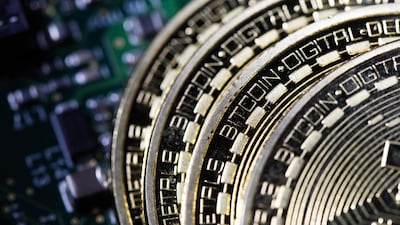Regal RA DMCC, a gold investment and trading firm in Dubai, is the first company in the Middle East to receive a license to trade cryptocurrencies, the Dubai Multi Commodities Centre said.
The company said it launched the world's first "deep cold storage" solution, which allows investors and traders to store their digital currencies - bitcoin, ethereum and other altcoins - in a vault located in Dubai's Almas Tower, the headquarters of free zone DMCC.
"We have developed what we believe is the number one most secure way of investing in bitcoin, ethereum and other crypto-commodities," Tyler Gallagher, chief executive of Regal Assets, which owns Regal RA, said in a statement on Tuesday.
The vault at DMCC is one of the most secure precious metal facilities in the world and will store all crypto investments in a physical form – without connection to a network – alongside the company’s current stock of physical gold.
Investors globally are seeing the potential in digital currencies, however, they are "reluctant to store large amounts of coins in online wallets and exchanges due to the high risk of hacking, identity theft, malware and other issues that can literally obliterate an investment", Mr Gallagher noted.
Last month, hackers stole about $530m worth of cryptocurrency from the Coincheck exchange in Japan - one of the biggest such heists ever. However, all the physical devices in Dubai are fully insured for the crypto-commodities market value against theft, hacking or natural disaster.
_______________
Read more:
Winklevoss twins do not fear cryptocurrency regulation
_______________
"This is a necessity more than us being creative. We have taken the approach of not putting at risk our money as well as our customers' money," Ksenia Kiseleva, Regal RA manager of the firm's Dubai office told The National. "We take that [online fraud] possibility out of the equation by offering the cold storage facility. It just put minds at ease.."
The Regal RA is already working on a crypto-commodities trading platform in Dubai, which is a work in progress and is subject to a regulatory framework being in place. The company also wants to expand its cryptocurrencies offerings to other markets in the world, she added.
The meteoric rise and volatile trading of cryptocurrencies such as bitcoin have kept investors spell bound. There are many in support of these currencies as a legitimate asset class while others have out rightly dismissed them. Billionaire investor Warren Buffet termed it as a bubble waiting to burst while the World Bank’s president Jim Yong Kim compared them to illegitimate “Ponzi schemes”. Others have expressed concerns about the lack of regulation and use of the digital currency by crime syndicates and money launderers.
Still, cryptocurrencies are gaining a foothold as a mainstream tender across markets as more and more companies offer goods and services in exchange for them.
The Isle of Man-headquartered Knox Group is one example of such firms. The company in September said it will launch a £250m (Dh1.19 billion) residential and commercial property project in Dubai, with residences that can be purchased in bitcoin. The 2.4 million-square-foot property venture called Aston Plaza and Residences, will be the first major real estate development that will accept cryptocurrency as payment, it said at the time.
Tenants, landlords and property investors, however, have reservations about the use of cryptocurrencies in real estate transactions, according to a February survey of Bayut.com, which found only 3 per cent of those polled by the Dubai property portal were interested in using a digital currency to buy, sell or rent property.
Ridiculed in its early days, bitcoin hit the high of nearly $20,000 last year, however, it has plunged to below $9,000 in extreme volatile trading earlier this month.
The trading of digital currencies in the UAE has yet to receive the seal of approval from market regulators. The Central Bank of the UAE issued a warning last October, reminding investors that no licence was issued for digital currencies in the country, and the regulator itself is not involved in supervising them.
Ms Kiseleva said Dubai and the UAE have an interest in crypto-commodities like anywhere else, but caution needs to be applied. The only way for crypto-commodities to thrive and flourish in the region or anywhere else in the world, is to have more regulation, full compliance and disclosures.
"We are working together with the DMCC to create parameters [for crypto-commodities] and allow crypto-commodities, to be able to exist at a regulated level," she said. "We can already see the industry accepting crypto-commodities if they are not anonymous and not used as form of payment."
On Sunday, the regulatory arm of the Abu Dhabi Global Market, the emirate's financial centre said it is considering a governing framework to supervise virtual currency exchanges and is in consultations with industry participants to chalk it out.
The Financial Services Regulatory Authority however, echoed concerns highlighted by the UAE's Securities and Commodities Authority last week. The country's markets regulator issued a warning to investors against using initial coin offerings amid a sharp decline in the value of cryptocurrencies.
The SCA warned investors against any fundraising done through cryptocurrencies, be it ICOs, initial token offerings, token pre-sale or token crowd-sale, it said in a statement on its website.
ICOs are used by companies to raise funds whereby a company sells shares to the public in a fiat currency and lists it on a stock exchange. Many regulators around the world have issued warnings to investors after instances of fraud in the ICO market. In 2017, some $6bn was raised in ICOs, according to Cointelegraph, a cryptocurrency news website.


